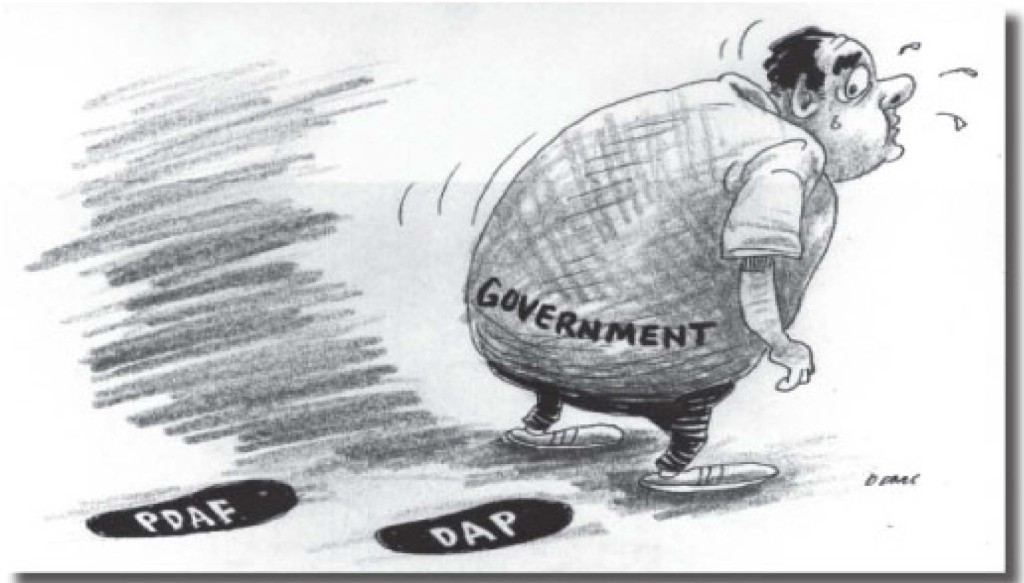 People call the tussle a whimsical blackmail, others retaliation while some others sheer leverage. If by the strike of the pen of the supreme magistrates of the Republic of the Philippines, the fatty pork barrel called Priority Development Assistance Fund (erstwhile Countrywide Development Fund or CDF) and recently Disbursement Acceleration Program fund were adjudged to be unlawful, the executive branch avenges with angst to take control of the funds of the judiciary, commencing with the Judiciary Development Fund.
People call the tussle a whimsical blackmail, others retaliation while some others sheer leverage. If by the strike of the pen of the supreme magistrates of the Republic of the Philippines, the fatty pork barrel called Priority Development Assistance Fund (erstwhile Countrywide Development Fund or CDF) and recently Disbursement Acceleration Program fund were adjudged to be unlawful, the executive branch avenges with angst to take control of the funds of the judiciary, commencing with the Judiciary Development Fund.
With the Supreme Court finding both the PDAF and DAP as unconstitutional, it is deemed imperative upon the executive branch to refrain from utilizing funds which are earmarked for purpose other than the which the funds are actually spent. By operation of law, Malacañang, through the President, should cease to resort to this specially designated fund to advance its pursuits. Not to pre-empt the High Tribunal’s action to whatever legal remedy Malacañang is taking, the executive branch could rather take a modest stance so as not to create divisiveness among the Filipino race.
Who gets a better mooring between the judiciary and the executive branch with the Constitution as the fundamental law of the land? Malacañang banks on the Administrative Code to rationalize the release of funds from other sources for which they are intended, or easily, transferred funds. The Administrative Code provision, though yet unquestioned, is boldly inferior to the Philippine Constitution.
Besides the fact that the judiciary is a co-equal branch of the government along with the executive and the legislative branches, the basic principle of separation of powers and the principle of check and balance should at all times be honored, with setting aside the dictates of the Constitution. The independence and fiscal autonomy of the judiciary deserves prime respect. The Judiciary Development Fund, which is an offspring of a executive edict and never been questioned until after the PDAF and the DAP were ruled as unconstitutional, aptly belongs to the judiciary as the only means by which its measly share of less than 1% in the entire General Appropriations Act could be augmented. It aptly belongs to the Supreme Court for disposable and should not be held under the control of any other branch of the government. What specific law is there that authorizes the executive branch to augment any item in the GAA for their respective offices from savings in other items of their respective appropriations? The Constitution states, “No law shall be passed authorizing any transfer of appropriations.” In the first instance, how could there be savings if all of these monies as appropriated under the GAA are used for how their purpose uncorrupted. Further the Constitution provides, “No money shall be paid out of the Treasury except in pursuance of an appropriation made by law.” Now, there are moves to abrogate the JDF or if not all proceeds thereof be transferred from the Supreme Court to the Bureau of Treasury.
The public having known the practice of transferring any income from the vault of the agency or instrumentality of the government to the national treasury and realign them by way of DAP, could the Supreme Court be assured that it will get a share even a centavo of the JDF that will be transferred to the national government? Will the executive branch provide the third co-equal but least “favored” branch of government such hefty some as senators and congressmen enjoy when priority bills are to be passed? God-forbid the worst scenario, a supreme court that is wooed by DAP for a decision in favor of the powers that be.




